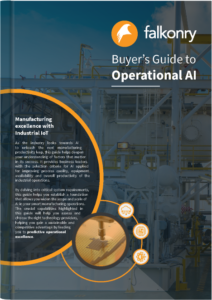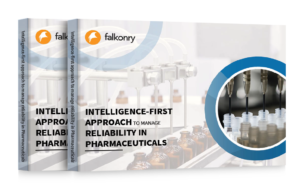Database-First vs Intelligence-First: The Cart Before the Horse
Key Takeaways:
- Data alone produces no value. Intelligence is needed to convert data into actionable information.
- Organizations that create the fastest feedback loops between data and decisions end up with the competitive advantage, not those that build the biggest database.
- Falkonry time series AI provides an intelligence-first alternative to the common database-first approach.
As we have deployed Falkonry, we have seen a very common approach to pursuing operational excellence through software: Build the database first. Find applications later. We have similarly seen how this approach plays out: Large volumes of data collected. Low levels of information generated. No value! The database is the cart. The intelligence needed to make use of the data is the horse. Why does the cart keep ending up before the horse? What can be done about it?

One thing plants typically have in abundance are sources of operational data. It is tempting to think that by collecting and storing that data, information of value will be generated magically. This does not happen. Extracting actionable insight requires engaging operational experts to make sense of the data. Compounding this challenge is a problem we have seen echoed in many places, including in this RFI issued from the Joint Artificial Intelligence Center: Historical data is usually incomplete. This makes it difficult to use because the context has been lost to time. Archiving data in hopes of using it later feels like a step forward but is actually a risky stalling tactic.
The bias for starting with the database is furthered in that storing data is something that IT vendors know how to do and do well. As we have all heard, data is the new oil. However, without an engine that can use oil as fuel, oil has no value. People didn’t spend billions of dollars digging wells, building pipelines, constructing tankers and commissioning storage facilities before the internal combustion engine was invented. Likewise, Google didn’t create the elaborate data infrastructure it has today when it was just a search engine (i.e. before becoming an advertising company). Amazon didn’t build the complex data infrastructure it has in place today when it had just started selling books. Observations begat analytics, begat tangible business benefits, begat more analytics, begat the new data collection techniques needed to support that increased demand.
Operational digitalization is no different! Our experience echoes that of Hitachi in that customers see a 300% and more ROI on predictive operations projects. This happens because our approach focuses on intelligence-first. Rather than collect and review historical data, the Falkonry Time Series AI Platfrom has the unique capability to discover relevant patterns in today’s operational data so that findings are relevant and actionable. Being a SaaS solution, it can be deployed quickly and value from it can be realized immediately. There is no need for a large, up-front investment in a database. Equally, there is no risk that the database put in place will be unable to meet the demands of the AI system and need to be replaced – twice – before the first dollar of operational risk has been retired. With the benefits realized using the the Falkonry approach, incremental investment in operational excellence becomes easier to justify. Finally, the horse can do its job.





